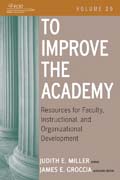
To improve the academy: resources for faculty, instructional, and organizational development
Miller, Judith E.
Groccia, James E.
An annual publication of the Professional and Organizational Development Network in Higher Education (POD), "To Improve the Academy" offers a resource for improvement in higher education to faculty and instructional development staff, department chairs, faculty, deans, student services staff, chief academic officers, and educational consultants INDICE: About the Authors. Preface. Acknowledgments. Ethical Guidelines for Educational Developers. SECTION ONE: Enriching Our Colleagues. 1 Taking Stock: Contemplating North American Graduate Student Professional Development Programs and Developers (Dieter J. Schönwetter, Donna Ellis). 2 Growing a New Generation: Promoting Self-Reflection Through Peer Observation (Allison Boye, Micah Meixner). 3 Support Needs of University Adjunct Lecturers (Sarah M. Ginsberg). 4 Understanding and Supporting Full-Time Non-Tenure-Track Faculty: A NeededChange (Genevieve G. Shaker, Megan M. Palmer, Nancy Van Note Chism). 5 Using Multimedia Case Stories of Exemplary Teaching for Faculty Development (Tasha J. Souza, Tom Carey, Flora McMartin, Roberta Ambrosino, Joe Grimes). 6 There Was Something Missing: A Case Study of a Faculty Member's Social Intelligence Development (Tamara Rosier). 7 Cross-Domain Collaborative Learning and the Transformation of Faculty Identity (James B. Young). 8 A Coaching-Based Framework for Individual Consultations (Deandra Little, Michael S. Palmer). 9. Professional Conversations: A Refl ective Framework for Collaborative Development (PeterShaw, Bob Cole). 10 Intersecting Identities and the Work of Faculty Development (Cerri A. Banks, Jonathan Iuzzini, Susan M. Pliner). SECTION TWO: EnrichingOur Campus Contexts. 11 The First Day of Class: How Should Instructors Use Class Time? (Sal Meyers, Brian C. Smith). 12. Student and Faculty Perceptions ofEffects of Midcourse Evaluation (Whitney Ransom McGowan, Russell T. Osguthorpe). 13 Evolution of a Peer Review and Evaluation Program for Online Course Development (Cynthia L. Adams, Dianna Z. Rust, Thomas M. Brinthaupt). 14 Completing the Faculty Development Cycle: Using Data from Syllabi Review to Inform Action (Phyllis Blumberg). 15 Social Capital and the Campus Community (Andrew N. Carpenter, Linda Coughlin, Susanne Morgan, Christopher Price). SECTION THREE: Enriching Our Craft. 16 Teaching and Learning Together: College Faculty and Undergraduates Cocreate a Professional Development Model (Alison Cook-Sather). 17 Using Students to Support Faculty Development (Teresa M. Redd, Carl E. BrownJr.). 18 The TA Consultant Program: Improving Undergraduate Instruction and Graduate Student Professional Development (Mikaela Huntzinger, Paul McPherron, Madhumitha Rajagopal). 19 Ready or Not? An International Study of the Preparation of Educational Developers (Nancy Van Note Chism). 20 Distribution and Penetration of Teaching-Learning Development Units in Higher Education: Implications for Strategic Planning and Research (Sally Kuhlenschmidt). 21 Toward a Scholarship of Faculty Development (Mark Potter). 22 Refl ections on InternationalEngagement as Educational Developers in the United States (Virginia S. Lee).
- ISBN: 978-0-470-62317-6
- Editorial: John Wiley & Sons
- Encuadernacion: Rústica
- Páginas: 352
- Fecha Publicación: 29/10/2010
- Nº Volúmenes: 1
- Idioma: Inglés
